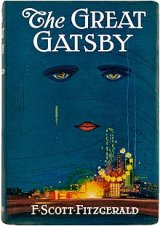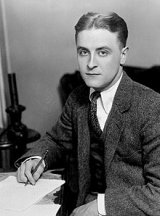The Great Gatsby Page #5
The Great Gatsby is a 1925 novel by American writer F. Scott Fitzgerald. Set in the Jazz Age on Long Island, near New York City, the novel depicts first-person narrator Nick Carraway's interactions with mysterious millionaire Jay Gatsby and Gatsby's obsession to reunite with his former lover, Daisy Buchanan. The novel was inspired by a youthful romance Fitzgerald had with socialite Ginevra King, and the riotous parties he attended on Long Island's North Shore in 1922
Saturday Evening Post—the words, murmurous and uninflected, running together in a soothing tune. The lamplight, bright on his boots and dull on the autumn-leaf yellow of her hair, glinted along the paper as she turned a page with a flutter of slender muscles in her arms. When we came in she held us silent for a moment with a lifted hand. “To be continued,” she said, tossing the magazine on the table, “in our very next issue.” Her body asserted itself with a restless movement of her knee, and she stood up. “Ten o’clock,” she remarked, apparently finding the time on the ceiling. “Time for this good girl to go to bed.” “Jordan’s going to play in the tournament tomorrow,” explained Daisy, “over at Westchester.” “Oh—you’re Jordan Baker.” I knew now why her face was familiar—its pleasing contemptuous expression had looked out at me from many rotogravure pictures of the sporting life at Asheville and Hot Springs and Palm Beach. I had heard some story of her too, a critical, unpleasant story, but what it was I had forgotten long ago. “Good night,” she said softly. “Wake me at eight, won’t you.” “If you’ll get up.” “I will. Good night, Mr. Carraway. See you anon.” “Of course you will,” confirmed Daisy. “In fact I think I’ll arrange a marriage. Come over often, Nick, and I’ll sort of—oh—fling you together. You know—lock you up accidentally in linen closets and push you out to sea in a boat, and all that sort of thing—” “Good night,” called Miss Baker from the stairs. “I haven’t heard a word.” “She’s a nice girl,” said Tom after a moment. “They oughtn’t to let her run around the country this way.” “Who oughtn’t to?” inquired Daisy coldly. “Her family.” “Her family is one aunt about a thousand years old. Besides, Nick’s going to look after her, aren’t you, Nick? She’s going to spend lots of weekends out here this summer. I think the home influence will be very good for her.” Daisy and Tom looked at each other for a moment in silence. “Is she from New York?” I asked quickly. “From Louisville. Our white girlhood was passed together there. Our beautiful white—” “Did you give Nick a little heart to heart talk on the veranda?” demanded Tom suddenly. “Did I?” She looked at me. “I can’t seem to remember, but I think we talked about the Nordic race. Yes, I’m sure we did. It sort of crept up on us and first thing you know—” “Don’t believe everything you hear, Nick,” he advised me. I said lightly that I had heard nothing at all, and a few minutes later I got up to go home. They came to the door with me and stood side by side in a cheerful square of light. As I started my motor Daisy peremptorily called: “Wait!” “I forgot to ask you something, and it’s important. We heard you were engaged to a girl out West.” “That’s right,” corroborated Tom kindly. “We heard that you were engaged.” “It’s a libel. I’m too poor.” “But we heard it,” insisted Daisy, surprising me by opening up again in a flower-like way. “We heard it from three people, so it must be true.” Of course I knew what they were referring to, but I wasn’t even vaguely engaged. The fact that gossip had published the banns was one of the reasons I had come East. You can’t stop going with an old friend on account of rumours, and on the other hand I had no intention of being rumoured into marriage. Their interest rather touched me and made them less remotely rich—nevertheless, I was confused and a little disgusted as I drove away. It seemed to me that the thing for Daisy to do was to rush out of the house, child in arms—but apparently there were no such intentions in her head. As for Tom, the fact that he “had some woman in New York” was really less surprising than that he had been depressed by a book. Something was making him nibble at the edge of stale ideas as if his sturdy physical egotism no longer nourished his peremptory heart. Already it was deep summer on roadhouse roofs and in front of wayside garages, where new red petrol-pumps sat out in pools of light, and when I reached my estate at West Egg I ran the car under its shed and sat for a while on an abandoned grass roller in the yard. The wind had blown off, leaving a loud, bright night, with wings beating in the trees and a persistent organ sound as the full bellows of the earth blew the frogs full of life. The silhouette of a moving cat wavered across the moonlight, and, turning my head to watch it, I saw that I was not alone—fifty feet away a figure had emerged from the shadow of my neighbour’s mansion and was standing with his hands in his pockets regarding the silver pepper of the stars. Something in his leisurely movements and the secure position of his feet upon the lawn suggested that it was Mr. Gatsby himself, come out to determine what share was his of our local heavens. I decided to call to him. Miss Baker had mentioned him at dinner, and that would do for an introduction. But I didn’t call to him, for he gave a sudden intimation that he was content to be alone—he stretched out his arms toward the dark water in a curious way, and, far as I was from him, I could have sworn he was trembling. Involuntarily I glanced seaward—and distinguished nothing except a single green light, minute and far away, that might have been the end of a dock. When I looked once more for Gatsby he had vanished, and I was alone again in the unquiet darkness. II About halfway between West Egg and New York the motor road hastily joins the railroad and runs beside it for a quarter of a mile, so as to shrink away from a certain desolate area of land. This is a valley of ashes—a fantastic farm where ashes grow like wheat into ridges and hills and grotesque gardens; where ashes take the forms of houses and chimneys and rising smoke and, finally, with a transcendent effort, of ash-grey men, who move dimly and already crumbling through the powdery air. Occasionally a line of grey cars crawls along an invisible track, gives out a ghastly creak, and comes to rest, and immediately the ash-grey men swarm up with leaden spades and stir up an impenetrable cloud, which screens their obscure operations from your sight. But above the grey land and the spasms of bleak dust which drift endlessly over it, you perceive, after a moment, the eyes of Doctor T. J. Eckleburg. The eyes of Doctor T. J. Eckleburg are blue and gigantic—their retinas are one yard high. They look out of no face, but, instead, from a pair of enormous yellow spectacles which pass over a nonexistent nose. Evidently some wild wag of an oculist set them there to fatten his practice in the borough of Queens, and then sank down himself into eternal blindness, or forgot them and moved away. But his eyes, dimmed a little by many paintless days, under sun and rain, brood on over the solemn dumping ground. The valley of ashes is bounded on one side by a small foul river, and, when the drawbridge is up to let barges through, the passengers on waiting trains can stare at the dismal scene for as long as half an
Translation
Translate and read this book in other languages:
Select another language:
- - Select -
- 简体中文 (Chinese - Simplified)
- 繁體中文 (Chinese - Traditional)
- Español (Spanish)
- Esperanto (Esperanto)
- 日本語 (Japanese)
- Português (Portuguese)
- Deutsch (German)
- العربية (Arabic)
- Français (French)
- Русский (Russian)
- ಕನ್ನಡ (Kannada)
- 한국어 (Korean)
- עברית (Hebrew)
- Gaeilge (Irish)
- Українська (Ukrainian)
- اردو (Urdu)
- Magyar (Hungarian)
- मानक हिन्दी (Hindi)
- Indonesia (Indonesian)
- Italiano (Italian)
- தமிழ் (Tamil)
- Türkçe (Turkish)
- తెలుగు (Telugu)
- ภาษาไทย (Thai)
- Tiếng Việt (Vietnamese)
- Čeština (Czech)
- Polski (Polish)
- Bahasa Indonesia (Indonesian)
- Românește (Romanian)
- Nederlands (Dutch)
- Ελληνικά (Greek)
- Latinum (Latin)
- Svenska (Swedish)
- Dansk (Danish)
- Suomi (Finnish)
- فارسی (Persian)
- ייִדיש (Yiddish)
- հայերեն (Armenian)
- Norsk (Norwegian)
- English (English)
Citation
Use the citation below to add this book to your bibliography:
Style:MLAChicagoAPA
"The Great Gatsby Books." Literature.com. STANDS4 LLC, 2025. Web. 23 Feb. 2025. <https://www.literature.com/book/the_great_gatsby_1598>.








Discuss this The Great Gatsby book with the community:
Report Comment
We're doing our best to make sure our content is useful, accurate and safe.
If by any chance you spot an inappropriate comment while navigating through our website please use this form to let us know, and we'll take care of it shortly.
Attachment
You need to be logged in to favorite.
Log In